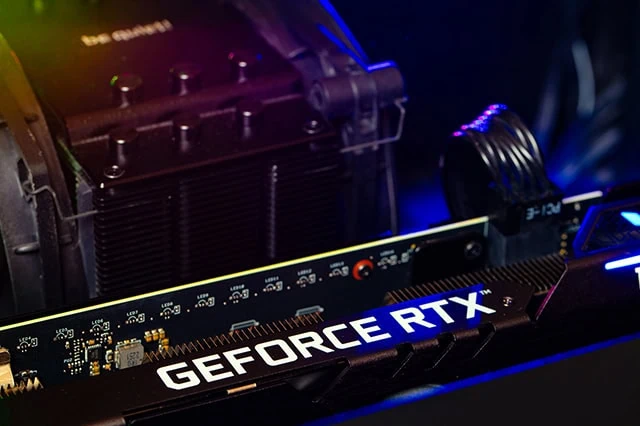There’s really only one thing about seeking out the best technology stocks that stays the same year in and year out:
It’s difficult.
The technology sector is constantly in a state of flux. And is there any wonder why? A group of businesses that make their money by innovating … well, their innovations have a tendency to upend their own industries again and again and again. Not to mention, not every technological innovation is a winner. For every iPhone, there’s a hoverboard. For every artificial intelligence, there’s a 3D TV.
How, then, do you separate the best tech stocks to buy now from the fad stocks trading on short-lived news trends? And how do today’s small technology stocks become tomorrow’s tech giants? Read on, and I’ll discuss that, and give you an overview of the best tech stocks for the rest of 2025.
Disclaimer: This article does not constitute individualized investment advice. Securities, funds, and/or other investments appear for your consideration and not as personalized investment recommendations. Act at your own discretion.
Why Invest in the Tech Sector?

Many investors are interested in top tech stocks for good reason. Disruptive technologies can sometimes lead to dramatic revenue growth, and dramatic gains in a firm’s stock price as a result.
In fact, technology companies sometimes chase that revenue growth for years without ever focusing on bottom-line profits. Some of the best-performing tech (and “tech-esque”) stocks in history include Amazon.com (AMZN) and Meta Platforms (META), which both prioritized ramping up their long-term scale over short-term profitability.
And look where they are now. Both are among the biggest companies on the planet, outperforming the market by wide margins over the last several years.
This is why many investors look for growth stocks within the tech sector and tech-adjacent companies. It’s not for the short-term profits or dividends, but rather the hopes of a “moonshot” stock that grows exponential revenue growth in short order, delivering life-changing profits to its investors in the process.
The Best Tech Stocks to Invest In
Some of the best-performing tech stocks are very recognizable names. But before you buy any of them, don’t forget that investing is fundamentally about the future. That means learning about the product pipeline and R&D beyond what’s on the surface.
Leading tech firms are often the parent company of lesser-known products or services that could be just as interesting. Particularly when it comes to entrenched mega-cap tech stocks, their future potential depends on revenue streams that have yet to be fully realized yet—not the big-name products consumers currently use.
The tech stocks here are listed in reverse order of market capitalization (so, from smallest to largest).
Best Tech Stock #8: Itron

- Industry: IT services and consulting
- Market capitalization: $6.1 billion
- Dividend yield: N/A
Itron (ITRI) is a producer of smart energy and water technology, solutions, and services that boasts customers in more than 100 countries.
Its offerings help electric utilities gain insights into power quality, load management, bypass detection, and voltage monitoring; provide advanced metering infrastructure, leak detection, pressure-reducing valves, and data analytics to water utilities; and even allow cities to optimize operations and achieve sustainability goals.
“Green” initiatives might fall in and out of popularity depending on who’s occupying national offices, and Itron has hardly been a pinnacle of stable top- and bottom-line growth—both seem to come in waves. But Wall Street is overwhelmingly optimistic about Itron’s long-term prospects; 10 out of 11 covering analysts call ITRI shares a Buy (the dissenter is a Hold), and their consensus view on long-term earnings growth is a brisk 24% annual clip.
“[Itron] should see growth opportunities in the coming years as customers work to strengthen their infrastructure and grid management capabilities to better manage the grid edge amid the increased demand for electricity and water resources from data centers, electric vehicles, and infrastructure automation,” says Argus Research analyst John Eade, who rates the stock at Buy. “We also expect strong demand for Itron’s products to continue over the next few years, as its customers benefit from grants from various governmental infrastructure investment programs.”
Related: The 15 Best ETFs for a Prosperous 2025
Best Tech Stock #7: DataDog

- Industry: Cybersecurity
- Market capitalization: $54.8 billion
- Dividend yield: N/A
Cybersecurity has been a growing theme for decades, lifting the fortunes of companies that specialize in it and prompting some larger tech conglomerates to add security capabilities to their repertoire.
Datadog (DDOG) is in the former group. The company operates an observability and security platform for cloud applications that is used by thousands of customers. Among its products and solutions are infrastructure and application performance monitoring, log management, digital experience monitoring, data observability, network monitoring, error tracking, and more.
The company’s revenues have been growing like a weed for years—the top line tripled between its last full year as a private company (2018) and its first full year as a publicly traded company (2020), then quadrupled between 2020 and 2024. Datadog also delivered its first full-year profit on a GAAP (generally accepted accounting principles) basis in 2023, then reported a 280% jump in earnings in 2024.
Wall Street generally loves what it sees going forward, too. DDOG’s bull camp is jam-packed at 38 Buys, against six Holds and one Sell. Their consensus estimate for long-term earnings growth is 26%.
But Datadog is also a good example of when caution is warranted, even among Wall Street’s most favored names. That’s because amid a solid second-quarter report that included a big “beat-and-raise,” some clouds appeared over one of its biggest clients.
“We believe concerns around less potential spend coming from its largest AI-native customer (OpenAI) is weighing on sentiment,” says a BofA Global Research analyst team led by Koji Ikeda. “This is because fears of lower spend from this customer could become a growth headwind later this year and/or next.”
Regardless, BofA remains solidly among DDOG’s many buys. “Results are demonstrating its ability to monetize the expanding cloud workloads opportunity, which should drive long-term durable growth and healthy [free cash flow]. … We continue to be bullish on DDOG. It is clearly an AI beneficiary and observability category leader. We believe that many AI natives and others with AI strategies will use Datadog to ensure digital experiences are running smoothly.”
Related: The 13 Best Mutual Funds You Can Buy
Best Tech Stock #6: Palo Alto Networks

- Industry: Cybersecurity
- Market capitalization: $149.8 billion
- Dividend yield: N/A
In an age of persistent cybersecurity and hacking concerns, Palo Alto Networks (PANW) stands out as a company with both a reliable customer base as well as the near certainty of increased revenue coming its way across the coming years.
But investors might have to deal with short-term turbulence as the cybersecurity darling makes a massive change to the way it does business.
Palo Alto is migrating to a security platform approach, and it’s banking on comped services to attract customers to it. That, as well as a slowdown in business with the federal government, led the company to lower full-year billings and revenue guidance at the start of last year, which tanked shares, shaking out at least a few bulls in the process. But PANW recovered throughout the rest of 2024, and while 2025 has been up and down, the stock is sitting on 20%-plus gains heading into 2025’s final innings.
By and large, the pros remain bullish on Palo Alto’s longer-term prospects, too. The stock currently has 40 Buys versus 12 Holds and two Sells.
Do you want to get serious about saving and planning for retirement? Sign up for Retire With Riley, Young and the Invested’s free retirement planning newsletter.
“We believe Palo Alto is having success in its platformization journey and is likely to succeed based on its innovation driven strategy and broad set of offerings. We believe the key to its longer-term success is the need for large training sets of data and broad-based coverage that can improve the effectiveness of next-generation products,” say William Blair analysts Jonathan Ho and Garrett Burkham, who rate shares at Outperform. “By laying the foundation with its network security products, XSIAM, AI, cloud, and SASE offerings, we believe Palo Alto will have significant advantages as agentic AI becomes a critical growth area over time. At the same time, standardizing on a platform offers significant management, reporting, training, and efficiency benefits, which should make further cross-sell and upsell opportunities easier over time.”
Another potential driver of Palo Alto shares going forward? In August, the company announced it would acquire CyberArk Software (CYBR), a software-based identity security solutions and services, in a deal that values CYBR at $25 billion, or a premium of just less than 30% of its pre-announcement value.
“With this acquisition, Palo Alto looks to acquire a best-in-class cybersecurity asset that is a leader in identity security,” says Stifel analyst Adam Borg, who rates PANW at Buy. “We believe this deal makes a lot of sense from a Palo perspective as it expands into an important and growing cybersecurity domain and expands its [total addressable market] by $29 billion, while also being a great outcome for CyberArk.”
Best Tech Stock #5: Shopify

- Industry: E-commerce
- Market capitalization: $232.6 billion
- Dividend yield: N/A
Shopify (SHOP) is an e-commerce infrastructure company that helps small and mid-sized businesses market and sell products through various digital sales channels. The basics include web and mobile storefronts, but SHOP also supports “omnichannel” integration with brick-and-mortar locations to manage inventory, as well as analytics and reporting to maximize profitability and customer loyalty.
We all know the potential of e-commerce thanks to the success of Amazon. But SHOP is concerned with every other merchant out there that also has the potential to reach new customers in a digital age.
Shopify has a large number of analysts on its side, at 32 Buys versus 19 Holds and one Sell. The pros believe SHOP will grow its top line by more than 20% in each of the next two years. And while earnings growth is expected to moderate significantly to about 15% in 2025, it’s projected to accelerate again next year, to nearly 30%.
Like the rest of the market, Shopify dropped like a rock earlier this year, though the company generated some of that pessimism on its own with light financial guidance. At the time, William Blair analysts (Outperform) called the post-earnings selloff a “buying opportunity,” adding that “although the stock could take a pause in the near term, we expect shares to move higher once investors get more visibility into the company’s growth and FCF trajectory.” SHOP is now back in the black for the year, and analysts continue to like what the stock has to offer.”
Good call. SHOP shares have only climbed since then.
“Shopify has established itself as a fast-growing, pure play SaaS Commerce application vendor that is taking share of retailer technology spend,” say Oppenheimer analysts, who rate the stock at Outperform. “We think Shopify is well led by a visionary and respected management team and are confident in its multi-year growth potential.”
Make Young and the Invested your preferred news source on Google
Simply go to your preferences page and select the ✓ box for Young and the Invested. Once you’ve made this update, you’ll see Young and the Invested show up more often in Google’s “Top Stories” feed, as well as in a dedicated “From Your Sources” section on Google’s search results page.
Best Tech Stock #4: Broadcom

- Industry: Semiconductors
- Market capitalization: $1.8 trillion
- Dividend yield: 0.7%
Broadcom (AVGO) is one of the world’s largest semiconductor companies. It designs, develops, manufactures, and supplies semiconductor and infrastructure software products for a wide variety of uses, including (but hardly limited to) artificial intelligence (AI), data centers, networking, wireless, storage, and industrial automation.
The company has been an innovator in its own right, but you can also chalk up much of its scale to a history of aggressive merger-and-acquisition (M&A) activity. The company—itself the product of a 2016 merger between Broadcom Corporation and Avago Technologies (hence the AVGO ticker)—has swallowed up the likes of LSI Corporation, Brocade, CA Technologies, VMware, and Symantec’s enterprise security business.
Regardless of how it got there, the resulting entity is one of Wall Street’s most beloved chip stocks, at 43 Buys, just three Holds, and zero Sells.
“We believe AVGO has one of the most strategically and financially attractive business models in semiconductors,” say Oppenheimer analysts, who rate the stock at Outperform. Among the reasons they love Broadcom are a “sustained competitive advantage in the high-end filter market, a ‘sticky’ non-mobile business, efficiently managed manufactury, and substantial earnings and free cash flow growth.
That last point is the main driver behind the company’s rapidly growing dividend, which has exploded by 80% in just the past five years alone. That puts AVGO not just among our favorite tech stocks, but also the best dividend stocks for beginners.
Related: 7 Best Schwab Index Funds for Thrifty Investors
Best Tech Stock #3: Amazon

- Industry: Online retail/cloud
- Market capitalization: $2.5 trillion
- Dividend yield: N/A
Amazon (AMZN) dominates the retail world. It is a one-stop shop for nearly anything you could want. And it has redefined customer expectations—they were a pioneer in two-day, one-day and even same-day shipping. And for that reason, Amazon is actually considered a consumer cyclical stock.
But because it’s also so much more than that, it’s typically mentioned in the same breath as other technology names, and it still deserves a spot among our best tech stocks.
Amazon is also the world’s biggest cloud provider through AWS, it’s an entertainment company through its Amazon Prime service, and it’s one of the biggest advertising companies, behind only giants Google and Facebook. AMZN makes for such an attractive stock because it’s supported by a diversified business with ample opportunities to enter new markets and disrupt well-seated industry incumbents.
Right now, AWS remains the workhorse.
“No question, we could well do without the (tariff) uncertainty,” says HSBC Analyst Christopher Johnen, who rates shares at Buy. “But fundamentally, we continue to see AMZN as exceptionally well placed and exposed to all the right structural themes. While our ‘harvesting the fruits of past investment’ theme has taken a tariff hit, we don’t see signs of a fading moat. In terms of value, we continue to argue AWS matters above all else.”
That said, Truist analyst Youssef Squali, who also sees AMZN as a Buy, points to the potential of yet another new business in the Amazon constellation.
“Project Kuiper, Amazon’s emerging satellite internet offering, is likely to become incrementally more important to the Amazon growth story as the company accelerates the pace of satellite launches over the next 12-18 months, and begins commercialization by the end of 2025,” Squali says. “Project Kuiper is ready for launch—we believe it could deliver annual revenue of $6 billion by 2030 against an investment of $13 billion-$15 billion.”
All told, AMZN shares enjoy a whopping 67 Buys versus a mere two Holds and no Sells.
Related: The 10 Best Vanguard Index Funds You Can Buy
Best Tech Stock #2: Microsoft

- Industry: Enterprise software
- Market capitalization: $4.0 trillion
- Dividend yield: 0.7%
Microsoft (MSFT) is a dominant tech stock that has seen amazing growth over the past few decades. But despite that, as well as a more than $3 trillion market cap, MSFT still shows no signs of slowing down.
The average person knows Microsoft for its iconic Windows and Office productivity software for personal computers, as well as its Xbox gaming console and related software, which is only getting more dominant after a nearly $70 billion deal to acquire game studio Activision Blizzard (ATVI).
But Microsoft also is a major player in cloud computing, via its still-growing Azure cloud services, and an emerging titan in artificial intelligence—for better or worse.
“This quarter helped validate our thesis that AI percolates up the stack, the ripple effect of Microsoft’s GPU compute leadership drives demand for their wider suite of higher-margin products which, uniquely, cover all layers of the tech stack,” says Goldman Sachs analyst Kash Rangan (Buy). “We believe that in an agentic world, as AI workloads rapidly scale, Microsoft will see benefits across its business, with demand for more storage, more databases, and more application usage.”
Revenue and profit projections for the current fiscal year are currently in the mid-double digits, with pros believing the stock can indeed keep getting bigger and delivering profits for its shareholders.
“We believe Microsoft is just hitting its next phase of monetization on the AI front and more enterprises are accelerating their AI budgets and strategic footprint with Redmond into FY26,” says Wedbush analyst Daniel Ives (Outperform), who adds that “the Street [is] not fully appreciating the growth story.”
If you’re looking for bears, you’ll have to look elsewhere. The analyst community currently has 57 Buy calls on the stock. Not a one is willing to call it a Hold, let alone a Sell.
Related: 9 Best Fidelity Index Funds to Buy
Best Tech Stock #1: Nvidia

- Industry: Semiconductors
- Market capitalization: $4.9 trillion
- Dividend yield: < 0.1%
Nvidia (NVDA) is the world’s top chip stock thanks to its dominance in semiconductors that are used in cutting-edge technologies. Applications for this firm’s hardware include self-driving cars, cryptocurrency mining, and other in-demand and growth-oriented areas of the 21st century economy.
But No. 1 with a bullet is the artificial intelligence market; Nvidia believes AI infrastructure can become a $3 trillion to $4 trillion opportunity over the next half-decade.
Nvidia might face some bumps between now and then, much like its slip-up following its recently reported second quarter. But if past is precedent, expect Wall Street to continue embracing NVDA unless something massive changes.
“Investors will focus on NVDA’s sales results & guidance, which were both slightly below buyside expectations,” says Truist Managing Director William Stein, who is one of 59 Buy calls on the stock, dwarfing four Holds and one Sell.. “We recognize this as a minor imperfection, and instead focus on management’s resilient longer-term outlook. … NVDA remains *the* AI company.”
Nvidia’s AI specialization has resulted in red-hot growth—a fire that’s only expected to continue burning. Analysts see revenue growth averaging 45% annually over the next two years, and long-term earnings growth at a clip of 35%. Indeed, NVDA sits on our list of the market’s best growth stocks right now, too.
Want to talk more about your financial goals or concerns? Our services include comprehensive financial planning, investment management, estate planning, taxes, and more! Schedule a call with Riley to discuss what you need, and what we can do for you.
Tech Stocks: Frequently Asked Questions (FAQs)

Is technology the best sector in the stock market?
Technology stocks regularly are among the best-performing stocks on Wall Street, and they historically beat the broader S&P 500 index. But that should not be misunderstood to mean that the tech sector is a sure thing. For instance, according to Pensions & Investments, the technology sector slumped by 28.2% in 2022—more than 10 percentage points worse than the broader market.
In other words, there are lots of reasons to like technology stocks and the tech sector. But there’s no such thing as a sure thing when it comes to investing.
Do you want to get serious about saving and planning for retirement? Sign up for Retire With Riley, Young and the Invested’s free retirement planning newsletter.
Are there any downsides to investing in tech companies?
Many tech companies can be quite volatile as they pursue their long-term potential, often at the cost of short-term profits—or even short-term stock performance. One of the most common downsides of investing in tech stocks is that they can move up and down much more dramatically than sleepy sectors such as utility stocks or consumer staples.
That’s also what makes them popular stocks to buy, however. Those big moves are great when they are in an investor’s favor. Just be aware that the big downside of investing in tech companies is … well, the potential for bigger downsides.
Related:






![10 Financial Gifts for Babies, Kids & Grandkids [No More Toys] 24 best financial gifts children kids babies](https://youngandtheinvested.com/wp-content/uploads/best-financial-gifts-children-kids-babies-600x403.webp)
![7 Best Investments for Kids [Investing for Children] 25 best investments for kids 1](https://youngandtheinvested.com/wp-content/uploads/best-investments-for-kids-1-600x403.webp)

